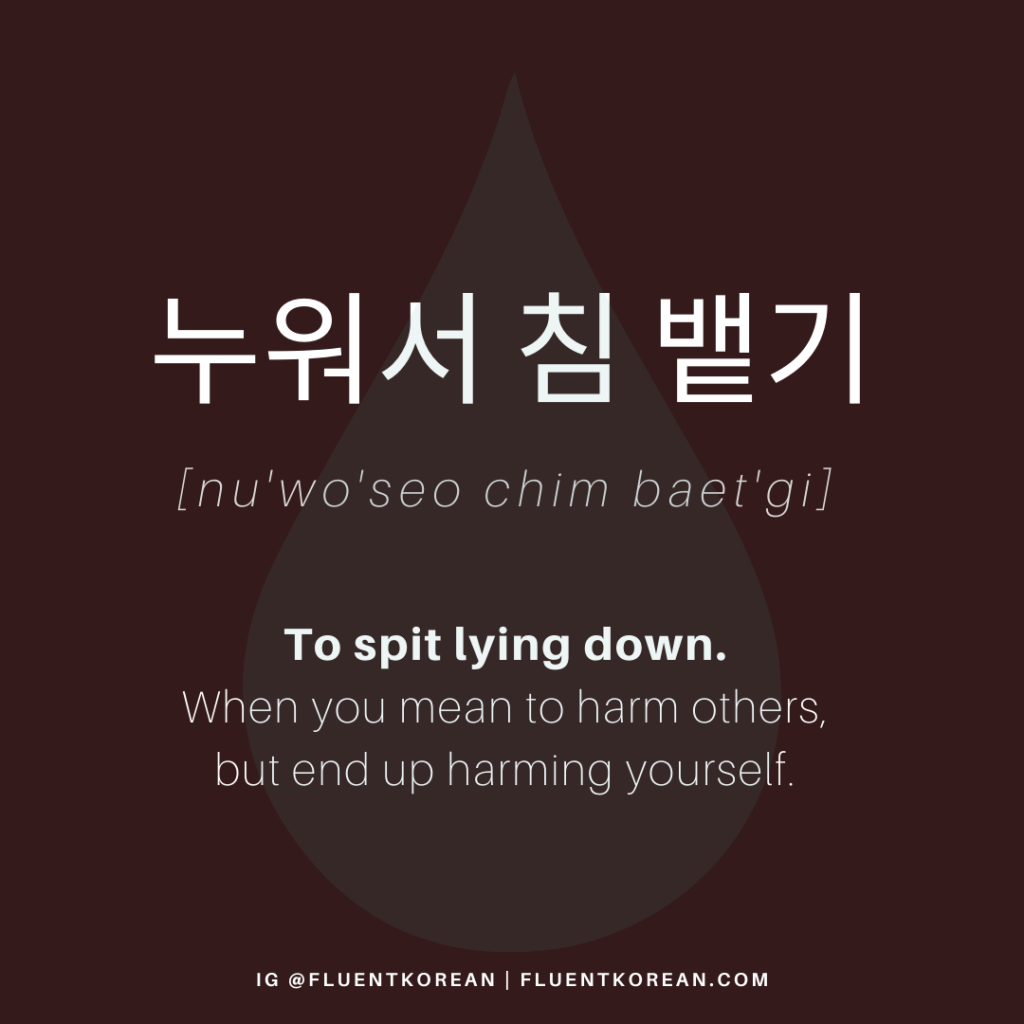
누워서 침 뱉기
[nu’wo’seo chim baet’gi]
What does this proverb mean?
Literally, 누워서 침 뱉기 means “to spit saliva while lying down on one’s back.”
누워서 침을 뱉으면 어디로 떨어질 것인가?
남에게 해를 끼치려다가 오히려 자게에게 해가 돌아올 때 쓰는 말.1
Picture in your head someone who is lying down on his back and sends a spitball straight up into the air. What goes up must come down. Where does the spit land? Directly on their face.
Figuratively, this expression is used to describe a situation where one means to harm another, but ends up harming themselves in the process.
Grammar and Vocabulary
This saying consists of the following words:
1. 눕다
Verb: To lie down (on one’s back)
Type: Irregular Verb (ㅂ)
How to conjugate 눕다2:
| Tense | Politeness | Deference | Conjugation |
|---|---|---|---|
| Declarative Present | Informal | Low | 누워 |
| High | 누워요 | ||
| Formal | Low | 눕는다 | |
| High | 눕습니다 | ||
| Past Base | 누웠 | ||
| Declarative Past | Informal | Low | 누웠어 |
| High | 누웠어요 | ||
| Formal | Low | 누웠다 | |
| High | 누웠습니다 | ||
| Future Base | 누울 | ||
| Declarative Future | Informal | Low | 누울 거야 |
| High | 누울 거예요 | ||
| Formal | Low | 누울 거다 | |
| High | 누울 겁니다 | ||
| Declarative Future Conditional | Informal | Low | 눕겠어 |
| High | 눕겠어요 | ||
| Formal | Low | 눕겠다 | |
| High | 눕겠습니다 | ||
| Inquisitive Present | Informal | Low | 누워? |
| High | 누워요? | ||
| Formal | Low | 눕니? | |
| High | 눕습니까? | ||
| Inquisitive Past | Informal | Low | 누웠어? |
| High | 누웠어요? | ||
| Formal | Low | 누웠니? | |
| High | 누웠습니까? | ||
| Imperative Present | Informal | Low | 누워 |
| High | 누우세요 | ||
| Formal | Low | 누워라 | |
| High | 누우십시오 | ||
| Propositive Present | Informal | Low | 누워 |
| High | 누워요 | ||
| Formal | Low | 눕자 | |
| High | 누웁시다 | ||
| Connective “if” | 누우면 | ||
| Connective “and” | 눕고 | ||
| Nominal | 누움 | ||
2. Verb + ~서
~서 is a clause connector that is added to verbs to indicate that one clause happens after the other. In this proverb, (A) one lies down first and then (B) spits. So one is doing the spitting in a state of lying down.
(A)누워서 (B)침 뱉기
3. 침
침 is a informal/colloquial noun that means saliva or spit. Its formal counterpart is 타액 (唾液).
타액을 분비하다. To secrete saliva.
4. 뱉다
Verb: To spit out, to spew
Type: Regular Verb
How to conjugate 뱉다3:
| Tense | Politeness | Deference | Conjugation |
|---|---|---|---|
| Declarative Present | Informal | Low | 뱉어 |
| High | 뱉어요 | ||
| Formal | Low | 뱉어요 | |
| High | 뱉습니다 | ||
| Past Base | 뱉었 | ||
| Declarative Past | Informal | Low | 뱉었어 |
| High | 뱉었어요 | ||
| Formal | Low | 뱉었다 | |
| High | 뱉었습니다 | ||
| Future Base | 뱉을 | ||
| Declarative Future | Informal | Low | 뱉을 거야 |
| High | 뱉을 거예요 | ||
| Formal | Low | 뱉을 거다 | |
| High | 뱉을 겁니다 | ||
| Declarative Future Conditional | Informal | Low | 뱉겠어 |
| High | 뱉겠어요 | ||
| Formal | Low | 뱉겠다 | |
| High | 뱉겠습니다 | ||
| Inquisitive Present | Informal | Low | 뱉어? |
| High | 뱉어요? | ||
| Formal | Low | 뱉니? | |
| High | 뱉습니까? | ||
| Inquisitive Past | Informal | Low | 뱉었어? |
| High | 뱉었어요? | ||
| Formal | Low | 뱉었니? | |
| High | 뱉었습니까? | ||
| Imperative Present | Informal | Low | 뱉어 |
| High | 뱉으세요 | ||
| Formal | Low | 뱉어라 | |
| High | 뱉으십시오 | ||
| Propositive Present | Informal | Low | 뱉어 |
| High | 뱉어요 | ||
| Formal | Low | 뱉자 | |
| High | 뱉읍시다 | ||
| Connective “if” | 뱉으면 | ||
| Connective “and” | 뱉고 | ||
| Nominal | 뱉음 | ||
5. Verb + ~기
Adding ~기 to a verb stem changes the verb into a noun. The word can then be used like a regular noun. The verb stem + ~기 also denotes a state of action or plate. The doing of something. It’s one way to turn a verb in a state of action into a noun.

Click here to see the breakdown of more Korean proverbs.
References
- 1.이영희, ed. 한손에 잡히는 우리속담. 초록세상; 2006.
- 2.눕다. Korean Verb App. https://koreanverb.app/?search=%EB%88%95%EB%8B%A4
- 3.뱉다. Korean Verb App. https://koreanverb.app/?search=%EB%B1%89%EB%8B%A4

